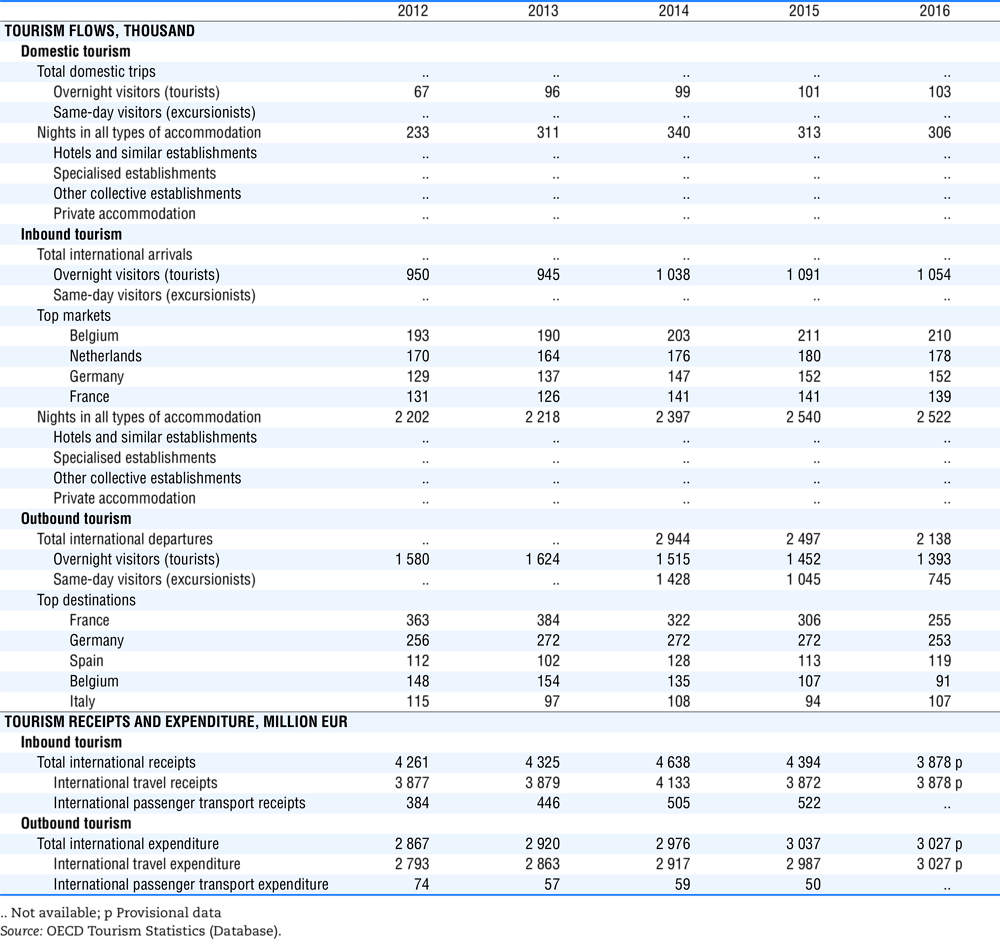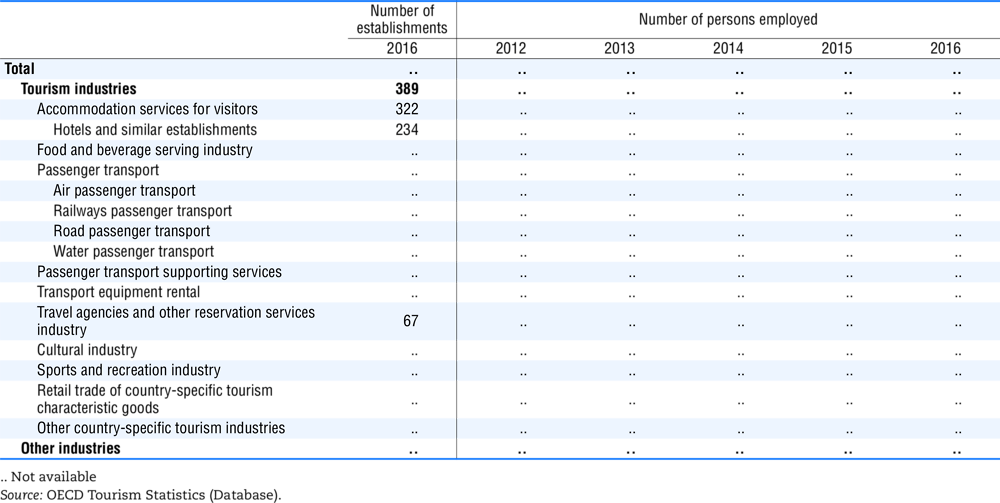Luxembourg
Tourism in the economy
In 2016 it is estimated that tourism contributed 1.7% of Luxembourg’s GDP directly and 5.1% if indirect impacts are also included. Tourism accounted for 6 000 jobs directly, with a total of 18 500 jobs being dependent either directly or indirectly on the sector (WTTC).
The number of overnight stays has risen steadily in the Grand Duchy of Luxembourg since 2010. 2016 was a record year for tourism in Luxembourg with 3 million overnight stays, an increase of 59% since 2010.
Luxembourg’s four main tourist markets are its neighbouring countries and the Netherlands, which in 2016 accounted for over 62% of overnight stays, comprising of the Netherlands (25.6%), Belgium (17.3%), Germany (11.2%) and France (8.3%). Other source markets, such as the United States, China and Japan, are seeing ongoing growth. Domestic tourism regularly accounts for around 10% of total overnight stays.
Tourism governance and funding
Since 2013, tourism has been under the responsibility of the Directorate General for Tourism (DGT), within the Ministry of the Economy (“the Ministry”). In addition to regulating tourism, the DGT coordinates the work of Luxembourg for Tourism (LFT), the national body responsible for tourism development and promotion, as well as the Regional Tourist Boards which coordinate the local services and cultivate the regional tourist offer. LFT defines and implements the national marketing strategy to enhance the country’s international image and reputation as a tourist destination, and also promotes Luxembourg as a destination for business and conferences.
The Directorate General for Tourism also supports accommodation businesses, associations and local administrations which promote tourism. The main aim is to develop both the quality of tourism and quality of life. The Ministry is represented within Luxembourg for Tourism’s decision-making bodies and regional tourism boards. In addition, regular meetings are held to ensure coordination and effective collaboration between the different parties. DGT is also responsible for assigning tourism labels, such as for hotel and camping classification, service quality, EcoLabel, EureWelcome, or bed+bike.
A budget of EUR 45 million was allocated for the five year plan for tourism covering 2013-17. The approved annual budget for the Directorate General for Tourism in the Ministry of the Economy has risen steadily since 2014, increasing from EUR 14.1 million in 2015 to EUR 14.6 million in 2016. Included in this amount are subsidies of EUR 3.7 million for Luxembourg for Tourism and EUR 1.8 million for regional tourism stakeholders.

Source: OECD, adapted from the Ministry of Economy, 2018.
Tourism policies and programmes
Tourism in Luxembourg is facing a number of challenges:
-
Offer quality: this small destination that is not well known to tourists requires an increasingly high-quality of offer and service to stand out from the competition,
-
Tourist structures: at national, regional and local level, tourist structures need to be more professionalised if they are to meet the current and future challenges of the tourist industry,
-
Digitalisation: the tourist sector will need to adapt to rapid developments,
-
Accessibility: the tourist offer needs to develop so that it becomes accessible to everybody,
-
Statistics: timely delivery of reliable data is crucial for tracking trends in tourism and adapting accordingly,
-
New growth markets: it is essential to adapt the offer to attract tourists from new growth markets,
-
Innovation: developing and supporting innovative tourism products,
-
Transparency: ensuring transparency in the tourism offer, especially in the hospitality sector.
In recent years, the Luxembourg government has put together a new medium- to long-term strategy for the tourist industry, in close collaboration with national and regional bodies, and based on a participatory approach. The strategy will shortly be made public.
A bill has been tabled to allow government to subsidise delivery of a tenth five-year plan for boosting tourist infrastructure (2018-2022), supporting tourism professionals in their efforts to develop tourism in Luxembourg and broaden the country’s tourism offer. This will include tourism projects initiated by municipalities, associations, non-profit organisations and private investors, as well as the owners or operators of various kinds of tourist accommodation. The new five-year plan will also continue to subsidise the costs of investment in programmes for certification of service quality.
To encourage development of a high-quality offer and ensure the greatest possible transparency, in 2017 the government launched a new hotel classification system. Already operated in many European countries under the patronage of HOTREC, Hotelstars Union offers a harmonised hotel classification with common criteria across Europe. Participation offers increased transparency and security to guests, enhancing the reputation and quality of hotels in its member countries. The Ministry is implementing this classification in close collaboration with HORESCA, the hotel federation. A new classification for camping sites will be rolled out in autumn 2017.
Hiking holidays are a major tourism niche for the country, and the focus on infrastructure quality for this market segment over the past ten years has led to two of its major trails being awarded the highly coveted European label “Leading Quality Trails – Best of Europe”.
Analysis of the current offer and benchmarking against the best European offers provide the basis for Luxembourg to compete with top performers in hiking tourism by 2020. With rising expectations in a competitive growth market, it will be essential to invest in clear, effective signposting, digital support and high-quality hiking infrastructure across the country. The new concept encompasses not only the trail network, but also local accommodation and food services, tourist attractions and cultural sights, as well as all forms of mobility.
A further specific priority has been given to the development and promotion of the MICE market in Luxembourg, where the MICE Luxembourg cluster was established by the Ministry of the Economy in 2015. In addition, the government is working with the sector to implement a number of development projects, including a timetable for MICE events, business quality guidelines, and a Green Meetings project designed to promote and showcase ecologically responsible events (Box 1.11).


